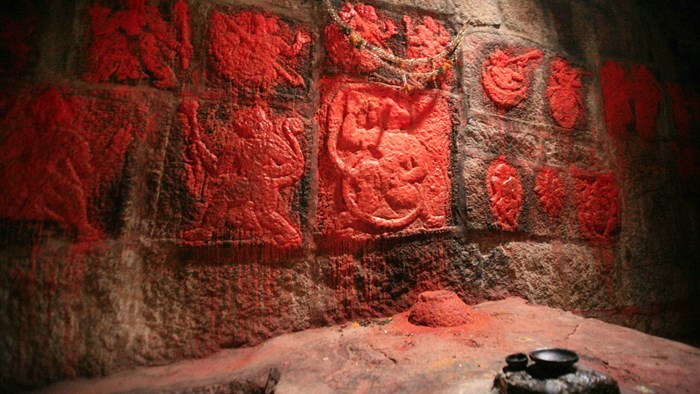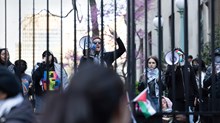
Update (Dec. 24): Members of India's opposition party protested a Hindu nationalist leader's remarks declaring the country a "Hindu nation" by suspending parliament on Monday.
On Sunday, Mohan Bhagwat suggested that the country's non-Hindus had been forcibly converted to Islam and Christianity. "We will bring back those who have lost their way," he said. "They did not go on their own. They were lured into leaving."
Bhagwat leads the radical Rashtriya Swayamsewak Sangh (RSS), a group closely linked with Prime Minister Narendra Modi's Bharatiya Janata Party (BJP). Reuters elaborates on the growing tension around its Hindu reconversion efforts and the political price Modi is arguably paying for not publicly calling for their end.
The New York Times also reports on the "Jesus trap," where Hindu nationalists have allegedly attempted to trick foreign religious leaders into baptizing Hindus as Christians in an effort to complicate their immigration status:
Hindu nationalists here claim that Muslims and Christians have been forcing Hindus to convert to their religions for centuries. So there is deep sensitivity to proselytizing by non-Hindus, particularly foreigners. Visas for religious professionals are strictly limited, some missionaries are instructed not to proselytize openly and, now that a Hindu nationalist has become India’s prime minister, hard-line Hindu groups have begun a long-dreamed campaign to claw back some of those conversion losses.
World Watch Monitor also notes that laws banning forced religious conversions are "ostensibly meant to protect individuals from unwelcome proselytizing," but instead they are "frequently used as a pretext to disturb and disrupt church services as well as to harass, beat up and accuse Christian believers and leaders."
----
A plan to convert 5,000 Indian Christians and Muslims to Hinduism on Christmas Day has been canceled by local officials. But organizers insist the conversions are merely postponed, and plan to protest Christmas baptisms at churches instead.
The ultimate aim of the Hindu nationalist group, affiliated with the Rashtriya Swayamsevak Sangh (RSS), is to make sure that Christianity and Islam “cease to exist” in India, reports the Washington Post. Debates over coerced religious conversions stymied India’s parliament this month, reports World Watch Monitor (WWM).
"Religious conversion is a matter of personal choice and the law permits it," said Abhishek Prakash, the district magistrate of Aligarh where the conversions were to take place, according to the Times of India. "However, if certain groups deliberately try to provoke communal sentiments by misusing this provision, then we will certainly not allow this to take place."
Shortly after Aligarh officials intervened, news broke that Prime Minister Narendra Modi (winner of Time magazine's reader poll for Person of the Year) had ordered lawmakers from his Bharatiya Janata Party (BJP), of which the RSS is an ideological wing, to rein in their pro-Hindu agenda, reports Reuters. The directive comes several weeks after Christian leaders in Nagaland, one of India's most-Christian states, used Modi's visit to their state to petition his government to better protect them, reports Morning Star News (MSN).
Asia News reports the fundraising for the mass re-conversion advertised that Christian converts “cost” 200,000 rupees (US $3,200) per person, while Muslim converts were more expensive: 500,000 rupees (US $8,000). One possible reason: Christians selected for conversion, which often involves food and financial incentives, were identified from 40 slums, while the Muslims were descendants of higher castes, reports the Economic Times.
Aligarh's 200-million person state, Uttar Pradesh, has recently been home to a string of alleged “re-conversion” incidents. In August, Hindu radicals claimed that they had turned a Seventh-day Adventist church in Asroi village in Aligarh district into a temple after they allegedly “re-converted” its 72 Christians to Hinduism. WWM cautioned such events are often propaganda, and Adventist News Network disputed the claim, reporting that a visiting delegation “found no evidence that the church had been disturbed.” However, an internal commission organized by the church later found that the Christians had indeed “reconverted of their own will because of little support from leadership.”
Later that month, police illegally detained a dozen pastors on false charges that they were “converting Hindus to Christians.” WWM reported the details.
The RSS has made calls for a single-faith country and is behind many of recent attacks against Christians, claim religious freedom watchdogs.
Of India’s top 10 states with the worst record for Christian persecution, five of them have been recently ruled by the BJP, according to a 2013 report from Mumbai's Catholic Secular Forum (CSF) based on 4,000 Christians attacked in 200 major incidents. Today, Chhattisgarh, Madhya Pradesh, and Rajasthan remain under BJP leadership. Uttar Pradesh does not appear on this list. (The Samajwadi Party, a socialist group, leads the state’s government.)
International Christian Concern explains one tactic RSS members have used to convince Christians to “re-convert”:
In the case of former Christians in Asroi, the Hindu radicals first warned them that they will lose government benefits designed to help poor people due to their religious identity. Next, they frighten these Christians with social expulsion from mainstream society if they remain as Christians. In order to ensure they didn't violate India's anti-forced conversion laws, the radicals likely told these reconverted Christians what to say in case their conversions were ever questioned.
Unease that Modi may prove ineffective at protecting India's religious minorities has existed since he was accused of failing to prevent the riot deaths of 1,000 Muslims in 2002 while chief minister of Gujarat. (The State Department ultimately banned him from visiting the United States, before lifting the ban in September. The Wall Street Journal offers more details.)
In Modi’s first 100 days of office, there have been more than 600 attacks on non-Hindus, reports WWM. India is No. 28 on the 2014 World Watch List.
More than a dozen village councils have banned non-Hindu religious activities, and more than 50 villages have banished non-Hindu missionaries. Likewise, Muslims have faced a smear campaign called “Love Jihad,” which accuses Muslim men of seducing and marrying Hindu women in order to convert them to Islam.
In the wake of this violence, Christians have voiced their grievances to the government. During Modi’s trip to Nagaland in November, representatives of several denominations, including Baptists and the Assemblies of God, pressed the government for help.
“We are deeply concerned about the continued violence and atrocities against Christians in different parts of India. We are deeply pained to see our brothers and sisters targeted for no fault of theirs,” a letter delivered to the prime minister stated. (The Times of India and MSN offer more details.)
Christians in Chhattisgarh, Madhya Pradesh, and Punjab states (the first two governed by the BJP) have also organized demonstrations protesting atrocities, reports MSN. Following the burning of a Catholic church at the beginning of December, more than 5,000 people protested outside the Delhi police force, claiming that law enforcement did little to protect the church.
CT examined Christian reaction to Modi’s election this spring, and noted when his visa was denied. CT also covered a new election strategy by Dalit Christians, and found some good news in India’s most persecuting state.
CT has also noted the BJP's rise, fall, and rise again in Indian politics. An election in 2001 rattled the BJP somewhat, and CT reported that a subsequent defeat in 2004 "sent shock waves across the nation." That significant defeat came after the BJP introduced an anti-conversion law to prevent conversion among Dalits, the lowest members of Indian society, without the approval of India's parliament.
But even as the BJP consolidated its state-level power in 2005, CT reported that increased violence and repression wasn't stopping church growth.
Violence against Indian Christians reached its worst point in 2008 in the southeastern state of Orissa, following the assassination of Hindu leader Laxmanananda. However, Christians were encouraged when the BJP lost control of Orissa in 2009, as well as lost control of Karnataka in 2013.
[Image courtesy of Laszlo Ilyes - Flickr]

Support Our Work
Subscribe to CT for less than $4.25/month


















